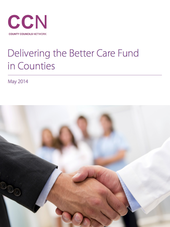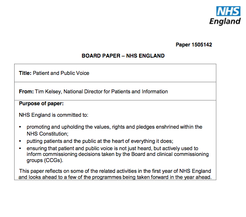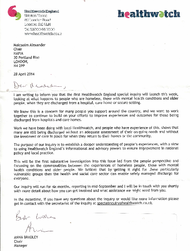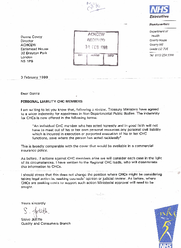NEWS - MAY 2014

CHRIS HAM REVIEWS THE WEEK'S HEALTH CARE NEWS http://www.kingsfund.org.uk/publications/articles/chris-ham-reviews-weeks-health-care-news
NHS NETWORKS daily news stories:
20:09pm, 27 May 2014
Consultation on NHS sustainable development plan
The NHS Sustainable Development Unit is seeking views on three new areas of its work: metrics, innovation and technology, and social value.
20:07pm, 27 May 2014
Public Health England seeks views on sexual health guidance
Public Health England has published a final draft of two documents for stakeholder comment.
20:06pm, 27 May 2014
Abortion guidance and procedures
The Department of Health has issued guidance for healthcare professionals on complying with the Abortion Act.
20:04pm, 27 May 2014
Safe staffing FAQs
NHS England has published frequently asked questions about trusts’ submission of staffing data.
20:02pm, 27 May 2014
Jeremy Hunt tells NHS staff about dementia
The secretary of state for health has issued a message to NHS staff explaining what is being done to tackle dementia.
19:59pm, 27 May 2014
RCN report on dementia care in hospitals
The Royal College of Nursing has published a report on a year-long programme about the role of nurses in dementia care.
19:56pm, 27 May 2014
Lack of time hinders GP collaboration
GPs say workload pressures and lack of time are preventing them from exploring collaborative ways of working, a BMA survey reveals.
20:09pm, 27 May 2014
Consultation on NHS sustainable development plan
The NHS Sustainable Development Unit is seeking views on three new areas of its work: metrics, innovation and technology, and social value.
20:07pm, 27 May 2014
Public Health England seeks views on sexual health guidance
Public Health England has published a final draft of two documents for stakeholder comment.
20:06pm, 27 May 2014
Abortion guidance and procedures
The Department of Health has issued guidance for healthcare professionals on complying with the Abortion Act.
20:04pm, 27 May 2014
Safe staffing FAQs
NHS England has published frequently asked questions about trusts’ submission of staffing data.
20:02pm, 27 May 2014
Jeremy Hunt tells NHS staff about dementia
The secretary of state for health has issued a message to NHS staff explaining what is being done to tackle dementia.
19:59pm, 27 May 2014
RCN report on dementia care in hospitals
The Royal College of Nursing has published a report on a year-long programme about the role of nurses in dementia care.
19:56pm, 27 May 2014
Lack of time hinders GP collaboration
GPs say workload pressures and lack of time are preventing them from exploring collaborative ways of working, a BMA survey reveals.
NHS NETWORKS daily message board updates:
21:39pm, 25 May 2014
Rash and swelling on feet.
Should perhaps also say that if I'm right, and it isn't treated, it could be serious. Responds rapidly to simple...
21:28pm, 25 May 2014
Rash and swelling on feet.
Looks like rat bite fever, (streptobacillosis) and if I'm right you'll have a leukocytosis. Lyme disease is an alternative but...
18:29pm, 25 May 2014
Rash and swelling on feet.
Possibly need a little more information - always difficult to daignose without the patient! Are the spots only below the...
21:39pm, 25 May 2014
Rash and swelling on feet.
Should perhaps also say that if I'm right, and it isn't treated, it could be serious. Responds rapidly to simple...
21:28pm, 25 May 2014
Rash and swelling on feet.
Looks like rat bite fever, (streptobacillosis) and if I'm right you'll have a leukocytosis. Lyme disease is an alternative but...
18:29pm, 25 May 2014
Rash and swelling on feet.
Possibly need a little more information - always difficult to daignose without the patient! Are the spots only below the...
14:58pm, 24 May 2014
Rash and swelling on feet.
Came up in rash on feet and legs for 3 weeks, Both feet are swollen but one looks bruised and...
09:09am, 24 May 2014
More distant, specialist hospitals are good for us? Really?
Hi Keith, Here is an abridged extract from one of our recent coms regarding a vulnerable adult, compassion and nursing...
Rash and swelling on feet.
Came up in rash on feet and legs for 3 weeks, Both feet are swollen but one looks bruised and...
09:09am, 24 May 2014
More distant, specialist hospitals are good for us? Really?
Hi Keith, Here is an abridged extract from one of our recent coms regarding a vulnerable adult, compassion and nursing...
INFORMATION FOR HEALTHWATCH 58
Information for Healthwatch aims to pick up DH, CQC, LGA, NHSE, HWE Monitor and other reports that Local Healthwatch will need to know about and to pass on other information I glean from other sources, including the King's Fund Health Policy and Management Alerts and HAPIA (NALM). It can't be comprehensive, so if you know of anything I should include please let me know, E&OE!
Click here to read the document ...
Information for Healthwatch aims to pick up DH, CQC, LGA, NHSE, HWE Monitor and other reports that Local Healthwatch will need to know about and to pass on other information I glean from other sources, including the King's Fund Health Policy and Management Alerts and HAPIA (NALM). It can't be comprehensive, so if you know of anything I should include please let me know, E&OE!
Click here to read the document ...
SHARING DATA
Changes to the NHS data-sharing scheme now make it fit for purpose, writes NHS England’s Information Director, Tim Kelsey
Last week the Care Bill received Royal Assent and became the Care Act and for the first time we have a clear, statutory basis for sharing information that will enable us to track patient outcomes across health and care services.
Changes to the NHS data-sharing scheme now make it fit for purpose, writes NHS England’s Information Director, Tim Kelsey
Last week the Care Bill received Royal Assent and became the Care Act and for the first time we have a clear, statutory basis for sharing information that will enable us to track patient outcomes across health and care services.
CORRECTION BY DofH - PAYMENTS BETWEEN NHS BODIES AND LA's ARE NOT 'RINGFENCED'
- Email: 22 April 2014 from Ruth Marsden - Vice Chair, HAPIA
- Email: 24 April 2014 from the DoH
- Email: 22 May 2014 from the DoH - Correction to previous email
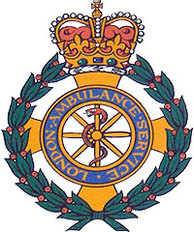
LONDON AMBULANCE SERVICE NHS TRUST
Stakeholder Email: (Confidential until 09.00am on Wednesday, 21 May 2014.
The attached statement has just been received from Fionna Moore the Medical Director of the London Ambulance Service. Please let me know if there are any issues you would like me to raise with Fionna. The Evening Standard is expected to run this story tonight - 21 May 2014.
Malcolm Alexander - hapia2013@aol.com
Stakeholder Email: (Confidential until 09.00am on Wednesday, 21 May 2014.
The attached statement has just been received from Fionna Moore the Medical Director of the London Ambulance Service. Please let me know if there are any issues you would like me to raise with Fionna. The Evening Standard is expected to run this story tonight - 21 May 2014.
Malcolm Alexander - hapia2013@aol.com
FRIENDS AND FAMILY TEST 'UNRELIABLE' COMPARISON TOOL - In-depth study concludes ...
May 2014
The friends and family test has been described as an unreliable means of comparing hospital healthcare. The finding comes in a new in-depth study, released weeks before a review into the tests is to be published by NHS England.
The analysis by Picker Institute Europe, revealed data generated for the friends and family test is so skewed by different collection methods it “cannot be reliably used to compare performance”.
The study – due to be published next month in the Journal of Health Services Research and Policy – joins a growing list of reports that have criticised the test’s reliability, undermining prime minister David Cameron’s ambition that it be used as “a single measure [for] quality of care across the country”.
Picker director of research and policy Chris Graham said that while the test could be useful within Trusts where data collection methods were kept consistent, it was “not suitable for comparing between trusts”.
The critique comes weeks before NHS England is due to publish a review of its controversial patient satisfaction survey.NHS England is soon expected to publish revised guidance for Trusts on how they collect data and use the test.
May 2014
The friends and family test has been described as an unreliable means of comparing hospital healthcare. The finding comes in a new in-depth study, released weeks before a review into the tests is to be published by NHS England.
The analysis by Picker Institute Europe, revealed data generated for the friends and family test is so skewed by different collection methods it “cannot be reliably used to compare performance”.
The study – due to be published next month in the Journal of Health Services Research and Policy – joins a growing list of reports that have criticised the test’s reliability, undermining prime minister David Cameron’s ambition that it be used as “a single measure [for] quality of care across the country”.
Picker director of research and policy Chris Graham said that while the test could be useful within Trusts where data collection methods were kept consistent, it was “not suitable for comparing between trusts”.
The critique comes weeks before NHS England is due to publish a review of its controversial patient satisfaction survey.NHS England is soon expected to publish revised guidance for Trusts on how they collect data and use the test.
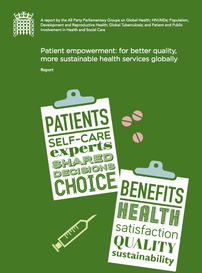
ALL PARTY PARLIAMENTARY GROUP REPORT
May 2014 - 36 pages
This report takes a global perspective on an issue that concerns us all, wherever we live: whether healthcare is something that is done ‘to’ us or ‘with’ us.
Poor health can be profoundly disempowering, but we should all have the chance to understand what is wrong, be involved in making decisions about our treatment, and take responsibility for managing the parts of our care that we are able to. Providing care in this way isn’t just a vital component of good quality, it’s also essential to the sustainability of health systems for the future. This is as true for the UK as it is for countries where many people never see a doctor during their lifetime.
The NHS has made real progress over the years in strengthening the patient role. Thanks to huge social and technological change, reforms to professional education, the commitment of successive governments and many other factors, the role of the patient is slowly becoming less passive. Still, examples of poor care are not hard to find and in several key areas we have struggled to see any improvement for over a decade.
As six All Party Parliamentary Groups working together, we wanted to look at the global picture on patient empowerment. As this report outlines, we found there is a great deal the UK can learn from other countries about transforming systems, behaviours and mind sets to change the patient role.
At the same time, there are also things other countries can learn from the UK, and the report suggests a number of practical ways the UK could be doing more to support the empowerment of patients abroad. Underlying the whole report is the simple message that giving renewed emphasis and investment to patient empowerment at every level.
May 2014 - 36 pages
This report takes a global perspective on an issue that concerns us all, wherever we live: whether healthcare is something that is done ‘to’ us or ‘with’ us.
Poor health can be profoundly disempowering, but we should all have the chance to understand what is wrong, be involved in making decisions about our treatment, and take responsibility for managing the parts of our care that we are able to. Providing care in this way isn’t just a vital component of good quality, it’s also essential to the sustainability of health systems for the future. This is as true for the UK as it is for countries where many people never see a doctor during their lifetime.
The NHS has made real progress over the years in strengthening the patient role. Thanks to huge social and technological change, reforms to professional education, the commitment of successive governments and many other factors, the role of the patient is slowly becoming less passive. Still, examples of poor care are not hard to find and in several key areas we have struggled to see any improvement for over a decade.
As six All Party Parliamentary Groups working together, we wanted to look at the global picture on patient empowerment. As this report outlines, we found there is a great deal the UK can learn from other countries about transforming systems, behaviours and mind sets to change the patient role.
At the same time, there are also things other countries can learn from the UK, and the report suggests a number of practical ways the UK could be doing more to support the empowerment of patients abroad. Underlying the whole report is the simple message that giving renewed emphasis and investment to patient empowerment at every level.
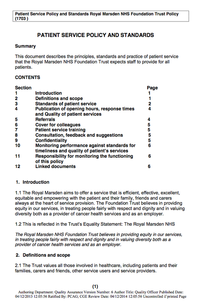
PATIENT SERVICE POLICY AND STANDARDS - ROYAL MARSDEN HOSPITAL NHS FT POLICY
6 pages
This document describes the principles, standards and practice of patient service that the
Royal Marsden HHS Foundation Trust expects staff to provide for all patients.
Is this an example of good practice?
All comments would be welcome. Either email directly to Malcolm Alexander, HAPIA on
HAPIA2013@aol.com - or make a comment via our Contact page on this site.
NHS COMPLAINTS PROCEDURES - HOUSE OF COMMONS - 2014
12 pages
This note provides information on NHS complaints procedures in England. The standard two- stage NHS complaints procedure, where complaints are first raised locally and with the option of referral to the Health Service Ombudsman, can be used for most complaints about NHS services. However, other options may also be appropriate in some cases depending on the objective of the complaint, such as obtaining an apology, compensation, disciplinary action, a change in policy or clarification of the law.
A section at the end of the note lists some of the organisations that can provide help and advice to patients who wish to make a complaint about NHS services.
It is important to note that some care services are provided by local authority social services departments. Complaints about these services are outside the scope of this note but further information is available from the Local Government Ombudsman website.
Procedures for NHS staff to raise concerns are covered in a separate Library Standard Note, NHS whistleblowing procedures in England (SN06490).
12 pages
This note provides information on NHS complaints procedures in England. The standard two- stage NHS complaints procedure, where complaints are first raised locally and with the option of referral to the Health Service Ombudsman, can be used for most complaints about NHS services. However, other options may also be appropriate in some cases depending on the objective of the complaint, such as obtaining an apology, compensation, disciplinary action, a change in policy or clarification of the law.
A section at the end of the note lists some of the organisations that can provide help and advice to patients who wish to make a complaint about NHS services.
It is important to note that some care services are provided by local authority social services departments. Complaints about these services are outside the scope of this note but further information is available from the Local Government Ombudsman website.
Procedures for NHS staff to raise concerns are covered in a separate Library Standard Note, NHS whistleblowing procedures in England (SN06490).
CONCERNS / COMPLAINTS RE. ADULT SOCIAL CARE NOW LINKED
Working together to help people raise concerns about adult social care - 12 May 2014
Together with the Local Government Ombudsman (LGO), the CQC has announced a new arrangement for people who want to raise concerns about adult social care in England. It will make it easier for people to complain about their care.
While the CQC has different remit to the LGO for investigating social care issues (CQC actions concerns about care services, while the LGO manages complaints), each organisation can receive around 20 enquiries a day that should be directed towards the other body.
From today, the new process will transfer enquiries between the organisations, saving people’s time and reducing the need for people to repeat information. Previously, people would have been advised to contact the other organisation themselves. But now, following the introduction of the new process, each body can transfer callers directly, as well as share information securely so people do not have to repeat their details.
Working together to help people raise concerns about adult social care - 12 May 2014
Together with the Local Government Ombudsman (LGO), the CQC has announced a new arrangement for people who want to raise concerns about adult social care in England. It will make it easier for people to complain about their care.
While the CQC has different remit to the LGO for investigating social care issues (CQC actions concerns about care services, while the LGO manages complaints), each organisation can receive around 20 enquiries a day that should be directed towards the other body.
From today, the new process will transfer enquiries between the organisations, saving people’s time and reducing the need for people to repeat information. Previously, people would have been advised to contact the other organisation themselves. But now, following the introduction of the new process, each body can transfer callers directly, as well as share information securely so people do not have to repeat their details.
SPECIALISED COMMISSIONING
Specialised services are those services commissioned centrally, not by CCGs, and provided in relatively few hospitals, to catchment populations of more than one million people. The number of patients accessing these services is small, and a critical mass of patients is needed in each treatment centre in order to achieve the best outcomes and maintain the clinical competence of NHS staff. These services tend to be located in specialist hospital Trusts in major towns and cities. Concentrating services in this way ensures that specialist staff can be more easily recruited and their training maintained. It is also more cost-effective and makes the best use of resources such as high tech equipment and staff expertise.
Specialised services are those services commissioned centrally, not by CCGs, and provided in relatively few hospitals, to catchment populations of more than one million people. The number of patients accessing these services is small, and a critical mass of patients is needed in each treatment centre in order to achieve the best outcomes and maintain the clinical competence of NHS staff. These services tend to be located in specialist hospital Trusts in major towns and cities. Concentrating services in this way ensures that specialist staff can be more easily recruited and their training maintained. It is also more cost-effective and makes the best use of resources such as high tech equipment and staff expertise.
INFORMATION FOR HEALTHWATCH 57 - Produced by Geoffrey Smith
- CCGs to have greater influence over NHS funding to improve primary care
- Bulletin for CCGs - 08 May 2014 issue
- NHS England Board Paper ... see below
- A guide to special measures
- NHS England's commitment to carers
- Choose and Book
- NICE Guidelines on Safe Staffing
- Delivering the Better Care Fund in counties ... see below
- Congenital Heart Disease Review - John Holden's 23rd Update
|
Delivering the Better Care Fund in Counties
May 2014 - 32 pages |
NHS England Board Paper 1505142
15 pages |
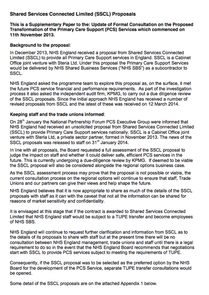
PRIMARY CARE SUPPORT OUTSOURCED TO INDIA
3 pages
NHS England is set to vote on whether to outsource all primary care support services to a part-private company.
Administrative support services for GPs could be outsourced to India under proposals to be considered by NHS England to slash costs.
ADMINISTRATOR'S RECOMMENDATIONS RE. TRUSTS ... COMMONS AMENDMENTS - CARE BILL
Earl Howe ... Conservative
As noble Lords may know, the Delegated Powers and Regulatory Reform Committee today reported on the amendments made in the other place to the Care Bill. It made two recommendations in relation to Amendments 32 and 46, which I am pleased to say the Government accept. Accordingly, I have today tabled Amendments 32A to D and Amendments 46A to E to give effect to those recommendations.
http://www.theyworkforyou.com/lords/?id=2014-05-07a.1477.4&s=healthwatch#g1505.1
Earl Howe ... Conservative
As noble Lords may know, the Delegated Powers and Regulatory Reform Committee today reported on the amendments made in the other place to the Care Bill. It made two recommendations in relation to Amendments 32 and 46, which I am pleased to say the Government accept. Accordingly, I have today tabled Amendments 32A to D and Amendments 46A to E to give effect to those recommendations.
http://www.theyworkforyou.com/lords/?id=2014-05-07a.1477.4&s=healthwatch#g1505.1
INFORMATION FOR HEALTHWATCH 56 - Produced by Geoffrey Smith
Information for Healthwatch aims to pick up DH, CQC, LGA, NHSE, HWE Monitor and other reports that Local Healthwatch will need to know about and to pass on other information I glean from other sources, including the King's Fund Health Policy and Management Alerts and HAPIA (NALM). It can't be comprehensive, so if you know of anything I should include please let me know. E&OE!
Information for Healthwatch aims to pick up DH, CQC, LGA, NHSE, HWE Monitor and other reports that Local Healthwatch will need to know about and to pass on other information I glean from other sources, including the King's Fund Health Policy and Management Alerts and HAPIA (NALM). It can't be comprehensive, so if you know of anything I should include please let me know. E&OE!
The King's Fund (TKF) - The NHS productivity challenge: experience from the front line
This report describes how six trusts have been dealing with the productivity challenge. It also suggests ways to prevent the NHS and social care from overspending, decreasing quality of care, or both. It puts forward the idea of running overlapping services – ‘double running’ – until new services and delivery arrangements take root, while acknowledging that payback (in terms of better quality services and improved productivity) may not be realised for some time. Finally, it finds that there needs to be a renewed effort to encourage clinicians to identify and lead change.
http://www.kingsfund.org.uk/sites/files/kf/field/field_publication_file/the-nhs-productivity-challenge-kingsfund-may14.pdf?utm_medium=email&utm_source=The+King%27s+Fund+newsletters&utm_campaign=4043517_HMP+2014-05-02&dm_i=21A8,2ENZX,FLWQ30,8QTX9,1
This report describes how six trusts have been dealing with the productivity challenge. It also suggests ways to prevent the NHS and social care from overspending, decreasing quality of care, or both. It puts forward the idea of running overlapping services – ‘double running’ – until new services and delivery arrangements take root, while acknowledging that payback (in terms of better quality services and improved productivity) may not be realised for some time. Finally, it finds that there needs to be a renewed effort to encourage clinicians to identify and lead change.
http://www.kingsfund.org.uk/sites/files/kf/field/field_publication_file/the-nhs-productivity-challenge-kingsfund-may14.pdf?utm_medium=email&utm_source=The+King%27s+Fund+newsletters&utm_campaign=4043517_HMP+2014-05-02&dm_i=21A8,2ENZX,FLWQ30,8QTX9,1
NHS England - Dementia prevalance calculator
This tool aims to provide locally relevant information about dementia care to facilitate the local planning of services specifically around the diagnosis of people with dementia.
http://dementiapartnerships.com/diagnosis/dementia-prevalence-calculator/?utm_medium=email&utm_source=The+King%27s+Fund+newsletters&utm_campaign=4043517_HMP+2014-05-02&dm_i=21A8,2ENZX,FLWQ30,8SNG6,1
This tool aims to provide locally relevant information about dementia care to facilitate the local planning of services specifically around the diagnosis of people with dementia.
http://dementiapartnerships.com/diagnosis/dementia-prevalence-calculator/?utm_medium=email&utm_source=The+King%27s+Fund+newsletters&utm_campaign=4043517_HMP+2014-05-02&dm_i=21A8,2ENZX,FLWQ30,8SNG6,1
NHS Confederation - The 2015 challenge declaration
The 2015 Challenge is being led by the NHS Confederation working with a wider group of other national representative bodies. It calls for a positive, shared vision for the future which encapsulates the needs, assets and wishes of the people using the health and care system, and the values of the people working in it. This document is the coalition’s analysis of the challenges that must be faced at the 2015 general election and beyond.
http://www.nhsconfed.org/Publications/Documents/2015_Challenge_Declaration_report.pdf
The 2015 Challenge is being led by the NHS Confederation working with a wider group of other national representative bodies. It calls for a positive, shared vision for the future which encapsulates the needs, assets and wishes of the people using the health and care system, and the values of the people working in it. This document is the coalition’s analysis of the challenges that must be faced at the 2015 general election and beyond.
http://www.nhsconfed.org/Publications/Documents/2015_Challenge_Declaration_report.pdf
New Local Government Network (NLGN) - Break on through: overcoming barriers to integration
This report focuses on what local areas can do themselves to transform, and how central government can support service integration. It highlights the key barriers to service integration and what actions need to be taken locally and by central government in order to facilitate change.
http://www.nlgn.org.uk/public/wp-content/uploads/BREAK-ON-THROUGH1.pdf
This report focuses on what local areas can do themselves to transform, and how central government can support service integration. It highlights the key barriers to service integration and what actions need to be taken locally and by central government in order to facilitate change.
http://www.nlgn.org.uk/public/wp-content/uploads/BREAK-ON-THROUGH1.pdf
NHSE Urgent and Emergency Care Review
The new blog from the leader of the review provides a useful update.
http://www.england.nhs.uk/2014/05/06/jonathan-benger/
The new blog from the leader of the review provides a useful update.
http://www.england.nhs.uk/2014/05/06/jonathan-benger/
FAILURES TO HELP THOSE WITH LEARNING DISABILITIES
Winterbourne View scheme an 'abject failure', Minister admits.
01 May 2014
A combined health and local government drive to help people with learning disabilities move out of hospitals by next month has been an “abject failure”, Norman Lamb has said in a scathing assessment.
With just one month to go before a key milestone is due to be reached, the care minister has branded progress “distressing”, “frustrating” and “utterly hopeless”.
Winterbourne View scheme an 'abject failure', Minister admits.
01 May 2014
A combined health and local government drive to help people with learning disabilities move out of hospitals by next month has been an “abject failure”, Norman Lamb has said in a scathing assessment.
With just one month to go before a key milestone is due to be reached, the care minister has branded progress “distressing”, “frustrating” and “utterly hopeless”.
MONITOR TO DISSOLVE CO-OPERATION AND COMPETITION PANEL
Monitor is dissolving its Co-operation and Competition Panel - the body which advises it on competition issues, the regulator has announced.
Monitor is dissolving its Co-operation and Competition Panel - the body which advises it on competition issues, the regulator has announced.


